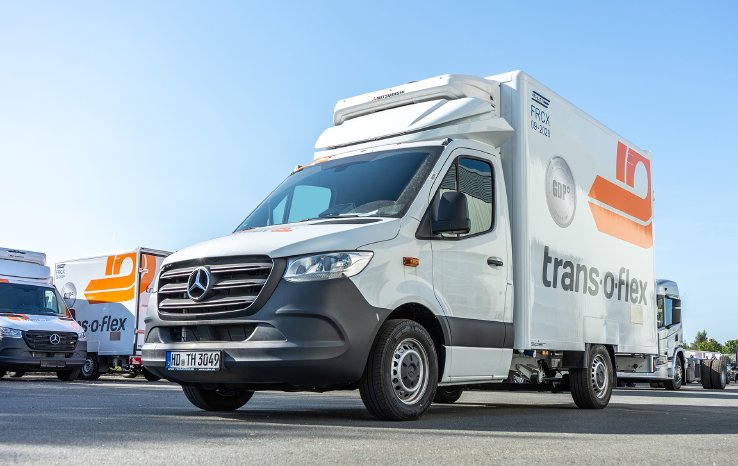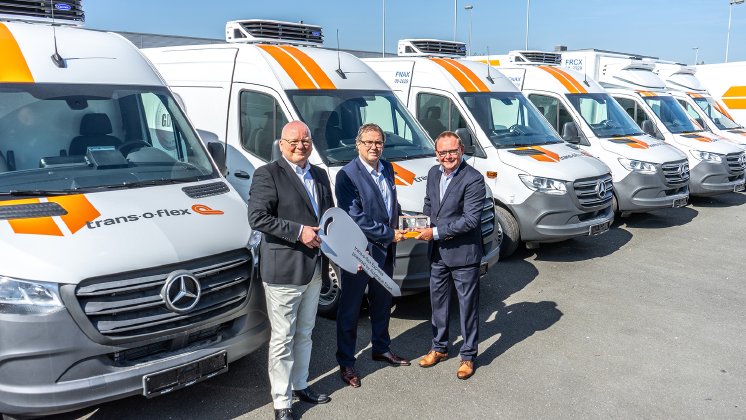- Sustainability: Innovative thermal units save fuel and enable CO2-free load compartment temperature control thanks to green electricity
- Modernisation and expansion of the fleet for temperature-controlled shipments at 2 to 8 and 15 to 25 degrees Celsius
- A total of more than 2,750 vehicles with active temperature control in use in Germany and Austria
All the box-body vehicles will be equipped with innovative electric thermal units
trans-o-flex ThermoMed will take delivery of 100 Mercedes Sprinters with a box body from Spier and 75 VW Crafters with a box body from Kress. "We were able to combine all the box-body vehicles with Mitsubishi electric refrigeration," explains Albeck. "They are more expensive to buy than conventional units, but they are quieter and cleaner to run and lower in overall cost." The reason for this is to save fuel.
Conventional thermal units in vans obtain the necessary energy exclusively from the vehicle's engine. "When the vehicle stops for delivery, the engine has to keep running to ensure that the temperature is maintained," explains Albeck. "This not only leads to higher fuel consumption but also to higher noise pollution."
Innovation put through its paces: performs well in all temperature ranges
Both can be avoided by electrically operated units, which ThermoMed tested in practice before ordering: in the pure cooling range of 2 to 8 degrees, in the so-called room temperature range of 15 to 25 degrees as well as in two-chamber operation with both temperature zones. "The units have performed to our expectations in all areas. They are a truly green innovation."
While driving, the power supply for the electrical units is provided by a separate buffer battery, which is charged by the alternator. As soon as the engine is off, the buffer battery provides the necessary power. The vehicle engine is also not needed for the necessary advance regulation of the load compartment to the correct temperature. For this purpose, the vehicle can be connected to a conventional 230‑volt socket, which is also used to charge the buffer battery. Albeck: "We have installed sockets at our charging gates, which allows us to pre-cool the vehicles electrically in summer and heat them in winter." Since trans-o-flex only uses green electricity from renewable energy sources, the advance temperature regulation of these vehicles is CO2-free. Another advantage of the new solution is that in the event of an engine failure, the vehicles maintain the set temperature for several hours thanks to the battery.
In addition to the box-body vehicles, trans-o-flex ThermoMed has already taken delivery of 23 fully temperature-controlled Mercedes Sprinter vans. Another 230 of these special box-type vans will be delivered to trans-o-flex Express for use in its Ambient service. The following applies to all new acquisitions: "Firstly, the vehicles are already qualified ex works according to pharmaceutical standards, either by the service provider Pharmaserv or VL Thermo-Solutions." This means they can be used to transport pharmaceuticals straight from delivery. "Secondly, all vehicles are now equipped with plug-in sensors that we use to measure the temperature."
New plug-in sensors save workshop visits
The advantage of these plug-in sensors is that the vehicles do not have to go to the workshop for the annual calibration of the temperature sensors. "We have concluded a contract with the supplier Euroscan Parts & Service, where the company's employees come to us for the calibration and carry it out professionally." This reduces vehicle downtime due to maintenance.
The current order includes 120 two-axle trailers from Krone for trans-o-flex's line haul services. Currently, a total of 467 actively temperature-controlled trailers certified to pharmaceutical standards are used in Express line haulage. In total, trans-o-flex has more than 2,750 vehicles with active temperature control in Germany and Austria.



